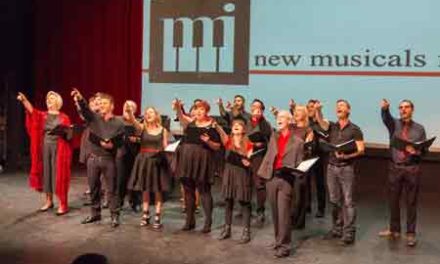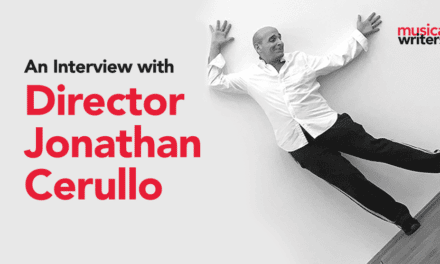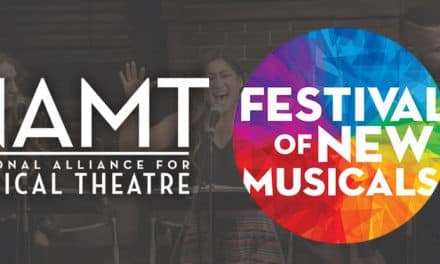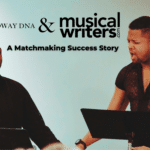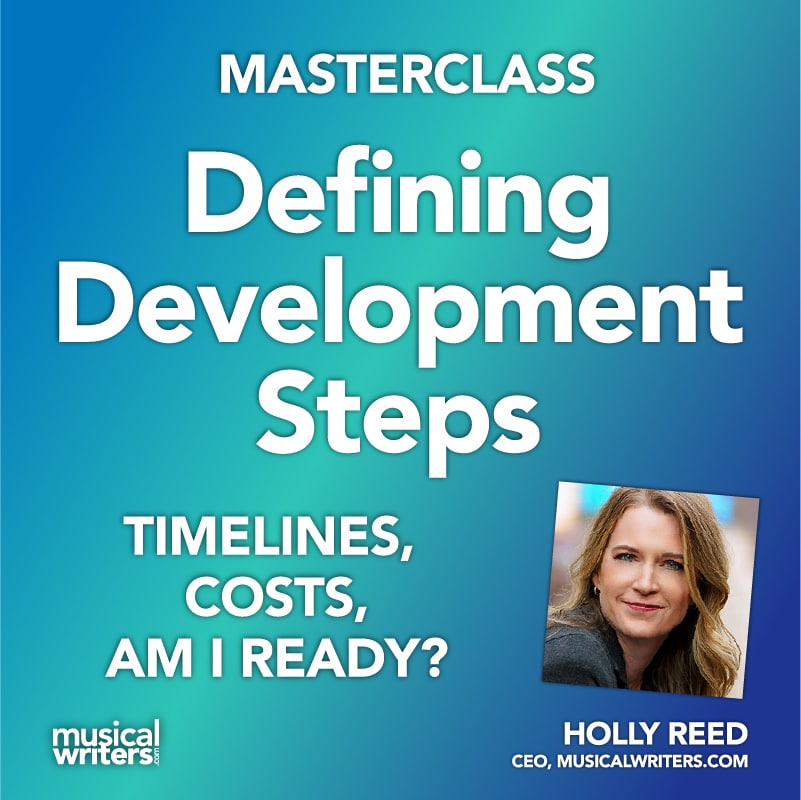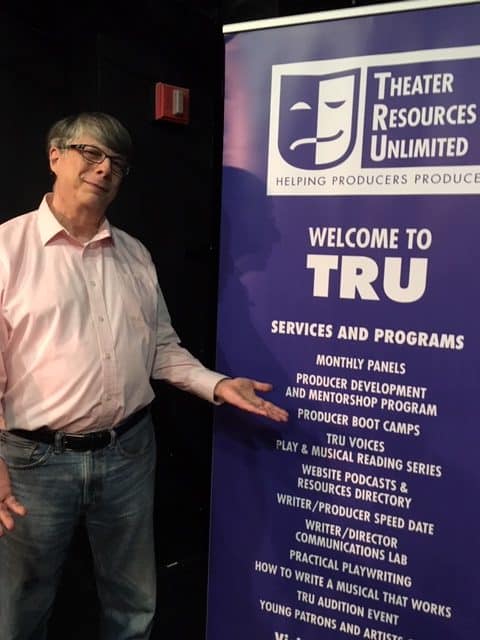
Bob Ost introduces upcoming TRU Events
New York City is a constant beehive of theatrical activity filling the four dozen Broadway houses and hundreds of smaller venues, rehearsal halls, and cabaret spaces. Although writers generate creative material, and in a sense, drive the whole process, it’s the producers and their teams that bring it to the public.
For musical writers interested in connecting with producers, or learning to self-produce, attending TRU events may be a viable place to start. The non-profit New York City-based organization Theater Resources Unlimited has been building relationships between producers and writers for nearly thirty years. With periodic writer-producer speed dates, writer-director communications labs, musical writing master classes, and regular panel discussions, TRU offers a steady stream of opportunities to network and learn about the producing world. Their website TRUonline.org keeps the events list current, and members get detail-filled newsletters by email.
Do composers, lyricists, and librettists belong in an organization that was founded originally to support producers? “Yes,” says executive director and TRU founder Bob Ost. “It behooves writers to understand the business better so that they function more professionally in the environment.” If nothing else, they will be savvier when signing contracts. But there’s much more.
The program benefits could be summarized in the word communication. “I find that a lot of writers cannot describe what they have written,” says TRU master class leader Skip Kennon, who previously ran the BMI Musical Theatre Workshop for twenty years. Programs like the writer-producer speed dates offer specific training with describing and pitching a show. The three annual TRU Beginnings workshops on “How to Write a Musical That Works,” also provide a chance to practice communicating about a show as it is being refined.

Cate Camarrata and Carol de Giere at TRU Event
I attended TRU’s introduction for the 2019/2020 season at The Playroom Theatre (one of several meeting places the group uses) in mid September to stay current with their latest work. Here are some notes from the meeting.
Connecting with Producers through TRU
Ost summarized the organization’s launch 27 years ago, and then explained: “At the heart is networking; it’s about meeting each other and finding out who is doing what.” He added, “We are at all levels of experience here. That was the unlimited part of Theater Resources Unlimited… Unlimited is important to us. We want you to feel welcome. We want you to feel that at whatever level you are, you have a right to be here, to talk about who you are and what you want to do. And to ask questions of people that may know more than you. And share your knowledge with them…. It’s all about community for us.”
Other speakers added their thoughts. Emileena Pedigo, a producer and coach for arts meets business, also praised TRU’s offerings, as did producer Ric Wanetik, dramaturg and literary manager Cate Cammarata, and board chairman Cody Lassen. The group’s Vice President and co-founder Cheryl Davis noted, “Once you’ve got that idea, once you’ve got that creative product, [you’re wondering] how do you bring it to an audience: what do you need legally, what do you need financially, what do you need for your creative team? That’s what TRU helps people figure out.” Entertainment attorney Lee Feldshon noted, “In addition to being a very human organization, an approachable and accessible organization, it’s really smart, practical, and informative. It’s a really important resource.”
The Writer-Producer Speed Date
Several times a year, TRU holds writer-producer speed dates to which anyone with a new musical or play may apply. Ost explained that after gathering 11 producers, he accepts 22 writers into the program. He, Cammarata and other pros coach writers for their pitches in advance. On the speed-date day, the writers rotate through the room over a two-hour period (11 at a time). Writers have two minutes to pitch their work, and the producer has two minutes to respond and give them feedback. The writers move to the next producer and the process continues.
Producer Cody Lassen enthused about the program: “To hear the pluses and minuses of your pitch from 11 different people is so valuable, not necessarily to change your script but to change your pitch. [You realize] ‘this is how I get people to read the script.’ It’s such a valuable skill. As far as I know this is literally the only way to get honest feedback.”
Ric Wanetik, who has been on the producer lineup, commented: “I think if you’re a playwright and you do this thinking you will find a producer who will love your work and have it produced, that’s an expectation that’s probably not going to be fulfilled. If you’re a playwright that really wants to have feedback about what you’ve done and how you need to communicate it, and what producers first ask about it, it’s a learning experience that you can [take away something from]?? Playwriting is a solitary process and you may not have thought about expressing all of what is in the text and how to communicate why somebody else should be excited to read it. It’s an opportunity for instantaneous feedback about it from 11 people.”
That said, some writers and producers do, in fact, match up during the speed dates. (Producer John Lant told me he finds all his writers this way.)
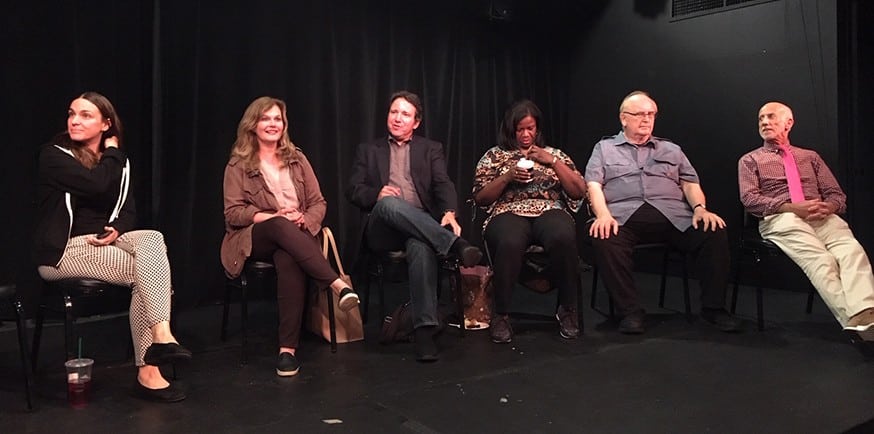
From left: Emileena Pedigo, Cate Cammerata, Lee Feldshon, Cheryl Davis, Skip Kennon, and Ric Wenetik (Not pictured but present: Cody Lassen)
How to Write a Musical That Works
This program, which Skip Kennon describes as a master class, emerged after a MusicalWriters.com event “First Act Feedback Fest” held in partnership with TRU in 2013. The talented people at TRU evolved it into a three-part series. Each involves live presentations from different writing teams in front of a panel of experts, (including Kennon and at least three others), who then all offer constructive feedback and suggestions. Writers from around the country submit material for the all-day sessions. Eight to ten musical teams are accepted.
Part I: The World and Want is held in the autumn. Part II: Conflicts and Obstacles is held in the winter. Part III: Reckoning and Resolution is held in the late spring or early summer.
Each musical writing team gets a half hour, which includes their presentation of 10 minutes of song and scene and then for 20 minutes the panelists talk about the presentations. “It’s very New Yorky and very exciting,” says Cammarata who co-facilitates the workshop. “If you don’t have the actors or musical director, we’ll help find them. We share actors and music directors. It’s a very collegial feeling.”
And More!
TRU also offers monthly evenings with panel discussions on relevant topics for theater today. Ost notes, “When we started TRU, the whole idea was to have an opportunity for people to put out requests to a roomful of peers and professionals. All of our panels start with [time] for people to ask the room for whatever it is they are looking for, and when we network afterward, people can come up and say, oh, I hear you are looking for this or that, and I know somebody who knows somebody…”
Last, but not least, TRU has a newsletter that goes to 3700 people. Members can submit a listing for an upcoming reading or show opening. It’s a great way to reach theatre makers in New York City.
Find out more at TRUONLINE.ORG
By Carol de Giere

